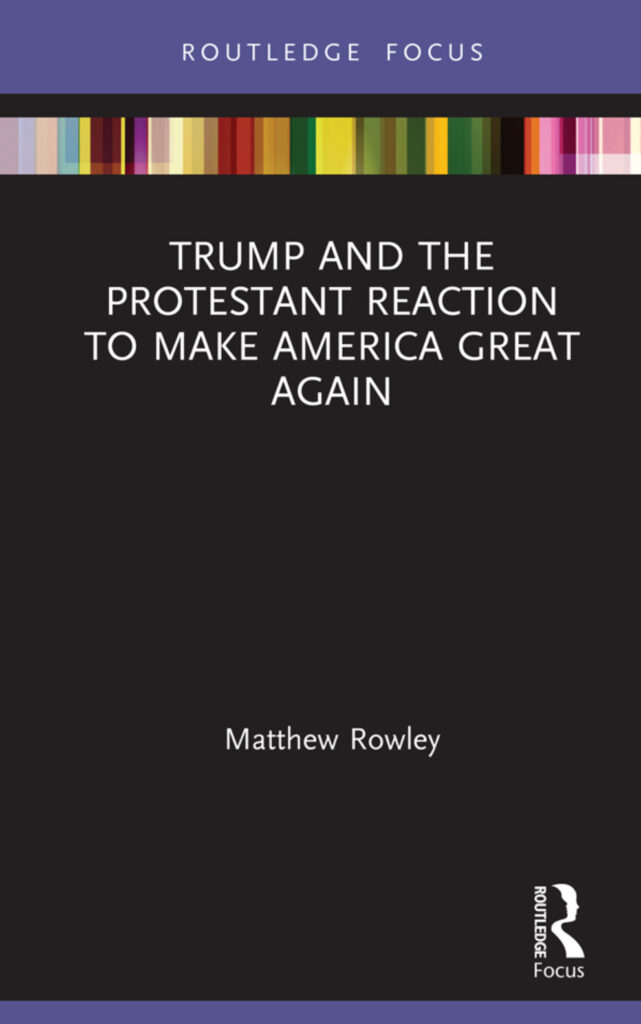How can we work toward a greater degree of freedom and justice for all if our memories of the past are fundamentally different? How can we pursue the general welfare and wellbeing of the people without common reference points? This is the dilemma raised by the Make America Great Again slogan. In Trump and the Protestant Reaction to Make America Great Again, historian Matthew Rowley reveals how Americans are divided over what and how to remember the past. Conservative and liberal Protestants disagree about whether to embrace or reject the Make America Great Again slogan depending on what they choose to remember or forget. In the midst of this gridlock, some Protestants are trying to chart a way forward by calling for a more nuanced and complicated understanding of the past. They trust Americans to recognize that the national past is just as complicated and contradictory as their own lives.
Divergent recollections of the puritan past illustrate the memory divide among Protestants. Conservative Protestant leverage this past to castigate liberals by framing them as puritanical fanatics bent on attacking and shattering all cultural icons at odds with their woke agenda. Trump’s often repeated use of the expression “witch hunt” is itself a way of equating liberals with Puritan zealots seeking his destruction. Liberals, on the other hand, draw from the same past to point to conservative extremism. Arthur Miller classic, The Crucible, uses the age of the Salem witch trials to underscore the excesses of the era of McCarthyism. In more recent times, Margaret Atwood, explained that she was inspired by the Puritan past to write a Handmaid’s Tale partly as a response to the rise of the religious right in America in the 1980s.
Just as Protestants on the left and right recall Puritan New England to aim fire at each other, they both find desirable elements from the same past. Many evangelical Protestants credit the Puritans with establishing the nation on a covenant with God. They regret how America has since drifted from its Christian roots. Protestants on the left gravitate to memories of the same period but for different reasons. They credit the Puritans for their forward thinking. They claim that many of the more progressive currents in contemporary America have their roots in Puritans times. The name of the progressive fundraising organization, Sixteen Thirty Fund, evokes this period as does one of the organizations it sponsors, Arabella Advisors. In 1630 the Arabella was the flagship of the fleet which brought future governor John Winthrop and his Puritan followers to what became the Commonwealth of Massachusetts.
Looking at how Protestants respond to the Make America Great Again slogan, Matthew Rowley identifies three camps. The first are those who support the MAGA slogan. The Make America Great Again camp are largely white, conservative and vote for Republicans. Rowley labels the second group as the Make America Lament camp. They are more ethnically diverse, generally liberal, and typically vote for Democrats. Rowley labels the final group as the Make America Better camp. They are much closer to the Make America Lament camp but take a more optimistic view about the past. America’s history has much to lament but that are also important redeeming qualities that we can build on as the basis for a better future.
Rowely asserts that Trump’s use of the MAGA slogan can be both exclusive or inclusive, depending on the background of his audience. If he is speaking to a predominately white audience he tends to accentuate the anti-immigrant, xenophobic rhetoric that is often featured in mainstream media coverage. However, when speaking at black churches, a locus far less covered by the media, his language is more inclusive and accepting of difference. In reality, however, Rowley argues that Trump seems little interested in history. He has spent far less time talking about the past compared with his predecessors. Although the MAGA slogan refers to the past, Trump never specifies which past and seems to leave the entire subject open to others to tailor to their own specific needs.
Patterns of forgetful remembrance were in place long before Trump and reactions to MAGA provide a snapshot into the partisan worldviews of Americans. We gain insights into the hopes and fears of voters, their ideas about good and bad governance, their sense of national pride and shame and their views about the justice of owning historical injustice. Matthew Rowley, Trump and the Protestant Reaction to Make America Great Again.
Looking more closely at the Make America Better camp Rowley explains that decline is a major point of emphasis. While those who support the Make America Great Again slogan see much to celebrate about the past, they generally regard the nation as having lost touch with its religious roots. Many in this camp regret the legal changes since the 1950s that banned religious organizations from contributing to political campaigns, banned prayer in the classroom, legalized abortion and gay marriage and generally made America, in their eyes, a more permissive and less Christian nation. While Trump was originally regarded as an ungodly man, Christian conservatives gradually came to see him as a supporter who could reverse the legal losses conservatives experienced since the civil rights era. Trump’s Supreme Court nominations, Republican appointments of Federal judges, and the landmark reversal of the constitutional right to an abortion validated the views of many conservative Protestants.
The Make America Lament camp sees little to celebrate about the past. America’s achievements, however significant, are overshadowed by the enormity of its past failures. From the eradication of Native Americans and the injustices of slavery and the Jim Crow era that follow to the second class status of women and diverse minority groups, American history offers a litany of wrongs that have yet to be righted. For many in the Make America Lament camp what stands in the way is the ignorance of Americans about their own history. Americans fail to understand the complexity of historical actors like Lincoln who might champion abolition while decrying interracial mixing. Moreover, few Americans have been educated about the hundred years of injustice that followed the end of the Civil War. Until we look into our past and root out the structural legacies of injustice in the present we cannot begin to talk about American greatness.
While those in the Make America Great Again and the Make America Lament camps have diametrically opposed views of American history they share a common fear of a more nuanced approach to the past. Both are fearful of the political consequences of acknowledging the position of the other. Make America Great Again supporters are reluctant to dwell on past failings of the nation for fear of sounding too supportive of the left. Make America Lament supporters are hesitant to emphasize past achievement for fear of sounding too supportive of Republican positions. On both sides of the political divide there is a shared skepticism and lack of confidence in the ability of Americans to contend with a more complex understanding of the past.
The Make America Better position overlaps with but goes beyond that of the Make America Lament camp. They too put the emphasis on the darker chapters in American history. They do not shy away from recognizing all the instances when the United States fell short of its lofty ideals. However, they stress that these regretful chapters should not negate and erase the country’s core values or what Martin Luther King Jr. described as America’s promissory note. America’s founders may never have intended for the rights of all citizens to be extended to women or non-whites but they nevertheless laid the groundwork for the gradual empowerment of all citizens. We should never forget past injustices but we should also not lose sight of the progress we have made as a nation and the progress that is yet to come.
In addition to more nuanced and complex treatments of the past, Rowley argues that Americans need to take a confessional approach to their history. They need to begin by confessing historical truths that are irrefutable and incontrovertible after which they can draw their own conclusions by connecting the dots to the present. For example, by first confessing the truth of treaties that may have disenfranchised a particular Native American population then connecting the dots to the near total lack of land ownership of that population in the present, Americans can arrive at their own conclusions about the impact of colonial history and Westward expansion on indigenous population. By giving Americans the tools and trusting them to have the ability to interpret the past for themselves we can begin to break free from the political uses of the past toward a shared future.*
*I would like to thank Matt Rowley for sharing this cover image with me.

Matthew Rowley
Dr. Matthew Rowley is Visiting Assistant Professor of History at Fairfield University (USA) and a Fellow of the Royal Historical Society. He has published five books, including God, Religious Extremism and Violence (Cambridge University Press, 2024), Godly Violence in the Puritan Atlantic World, 1636–1676 (Boydell & Brewer, 2024) and A Global Sourcebook in Protestant Political Thought, 1517–1660 (Routledge, 2024).


